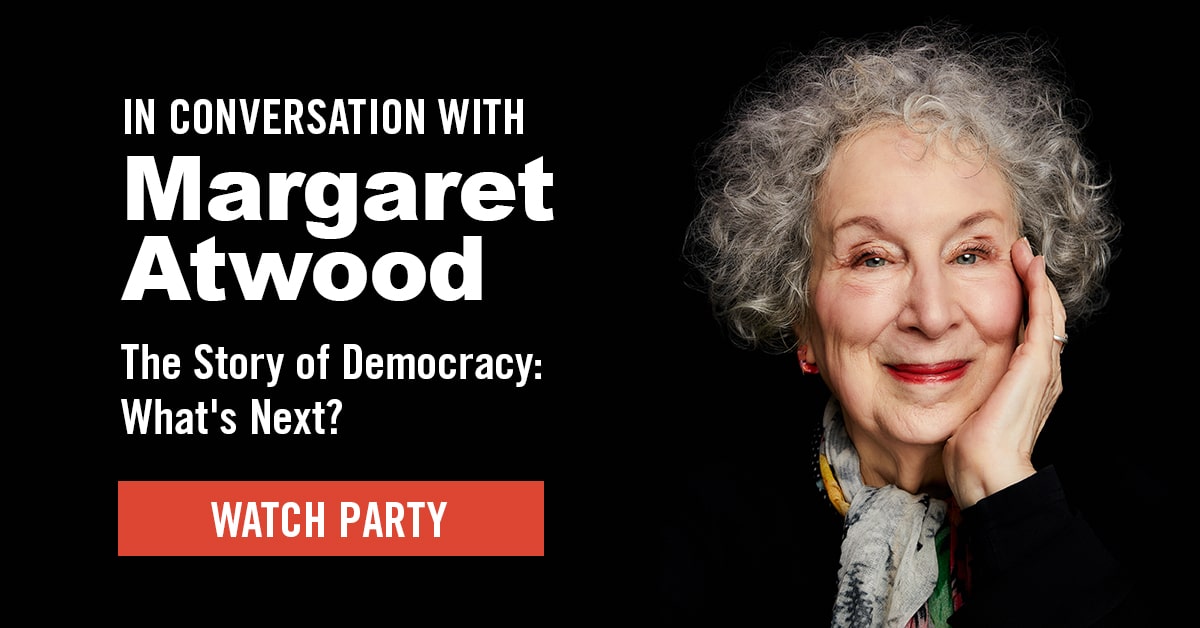Margaret Atwood and Randy Boyagoda on politics, literature, and freedom
In a recent screening, the two authors spoke to UofT students and faculty about what lies beneath our world’s political systems.
On September 28, 2022, the faculty of Arts and Science at the University of Toronto St. George (UTSG) invited students to attend a rare event at Convocation Hall. Joined by Canadian novelists Margaret Atwood and Randy Boyagoda, students and faculty had the opportunity to watch The Story of Democracy: What’s Next?—a screening where both authors spoke on how we can understand and question democracy through storytelling.
Atwood’s fictional worlds stem from her understanding of critical real-world issues. Through her novels, she continuously expresses that writing and communication are powerful tools that allow us to reflect on freedom. Amongst the thousands of students with vastly different experiences, personal values, and political views, the discussions at Convocation Hall elicited diverse responses and continued conversations.
Describing democracy as a “jagged line,” Atwood pinpointed that “there is no ‘yellow brick road’ that leads to the ‘Emerald City’ of politics. What we are seeing [now] in the United States is that some people do not seem to feel humbly towards women’s rights and women’s suffrage. There’s been active movements against [these issues], and there are commitments towards autocracies—but one thing autocracies can’t do, is they can’t control how you communicate.”
Atwood reflected on her storyline in The Handmaid’s Tale and connected the occurrences of her characters to today’s ongoings in democratic societies.
“What [we] have to watch out for is the deliberate creation of chaos,” Atwood said. “Because once you have chaos, everybody wants to go to Mr. Fix-it [referring to the government]. I think we’re seeing that in various places in the world, and we have to be against it.”
To further expand on Atwood’s points, Boyagoda, author of the novel Original Prin (2018) and current English professor at UTSG, called for a sense unity despite incompatible world views. He referred to our world as a “global village”—a space that continues to develop technologically but feels like it is drastically “shrinking.”
“In a global, or globalized village, we often have incompatible realities side by side,” Boyagoda stated. He called attention to the numerous individuals we sit beside on the bus, in classrooms, or in great halls, and revealed that we can never truly know their personal or societal ideologies. “And so, the question becomes: ‘How do we live together, if we have these incompatible realities?’”
During the Q&A session, Atwood and Boyagoda answered questions regarding social welfare democracy, capitalism, censorship, self and world views, and general political systems. I found Atwood’s reflections and her connections to literature compelling.
“I’ve never actually seen myself as anyone great,” Atwood said. “I don’t think it’s necessary to see yourself as anything great. You can see yourself as lots of things. You can see yourself as more than one thing.”
She continued to quote Offred, a character from The Handmaid’s Tale, when she said: “A story is like a letter. Dear you, I’ll say. You can mean more than one. You can mean thousands.”
Atwood and Boyagoda left the crowd feeling empowered to value individual voices. They reminded us that we have the power and the courage to take back our compromised freedoms.
For her closing remark, Atwood looked out into the crowd and said: “The Wizard of Oz is amongst you. Who is pretending to be a great person, when they are really just a ventriloquist?”

